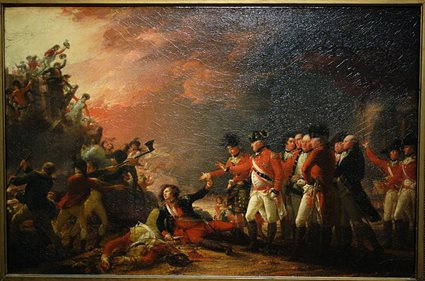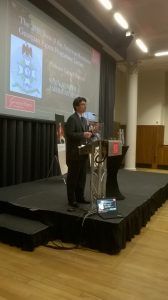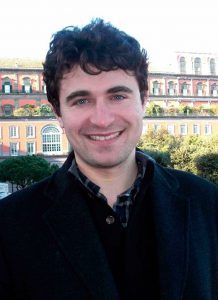Audio: Spain and the American Revolution
Spain and the American Revolution: the 2018 Sons of the American Revolution Georgian Papers Lecture delivered by Professor Gabriel Paquette at King’s College London, 30 March 2017

John Trumbell, ‘The Sortie Made by the Garrison of Gibraltar’ (1788, oil on canvas). Cincinatti Art Museum.
(The lecture itself begins at c. 11.25, following an introduction to the Programme and Professor Paquette. We apologise for the poor sound quality especially for the questions from the Q&A session at the end).
 Professor Paquette lectured on Spain’s role in the American Revolution. He is especially interested in the Anglo-Spanish relationship, and the outbreak of war between these two countries in 1779. George III strenuously sought to prevent long-standing rivalry with Spain from leading to war and he sought in vain to end hostilities at various points. Using the Georgian Papers and other manuscript sources, Paquette traced the evolution of Spain’s relations with Britain during the American Revolution, when the two Powers clashed from Honduras to Gibraltar. What emerged is a portrait of George III’s ‘personal diplomacy’ and British strategic priorities in the Mediterranean, Caribbean and Atlantic World more generally.
Professor Paquette lectured on Spain’s role in the American Revolution. He is especially interested in the Anglo-Spanish relationship, and the outbreak of war between these two countries in 1779. George III strenuously sought to prevent long-standing rivalry with Spain from leading to war and he sought in vain to end hostilities at various points. Using the Georgian Papers and other manuscript sources, Paquette traced the evolution of Spain’s relations with Britain during the American Revolution, when the two Powers clashed from Honduras to Gibraltar. What emerged is a portrait of George III’s ‘personal diplomacy’ and British strategic priorities in the Mediterranean, Caribbean and Atlantic World more generally.
 Gabriel Paquette is Professor of History at The Johns Hopkins University, Baltimore, USA, and was the 2017 Sons of the American Revolution Georgian Papers Programme visiting professor at King’s College London. His research explores aspects of European, Latin American and international History. His first book, Enlightenment, Governance, and Reform in Spain and its Empire, 1759-1808 (Palgrave, 2008) analyzed the intellectual origins of the later eighteenth-century reforms undertaken by the Spanish Crown in the Iberian Peninsula and Spanish America; in 2013 he published Imperial Portugal in the Age of Atlantic Revolutions: The Luso-Brazilian World, c. 1770-1850 (CUP). He is now working on a synoptic history of Western European ‘seaborne’ empires in the seventeenth and eighteenth centuries. In addition to his principal areas of research, Paquette has written on the history of Anglo-Iberian relations, Spanish American Independence, Marx and Hegel, Romanticism, and early nineteenth-century Liberalism.
Gabriel Paquette is Professor of History at The Johns Hopkins University, Baltimore, USA, and was the 2017 Sons of the American Revolution Georgian Papers Programme visiting professor at King’s College London. His research explores aspects of European, Latin American and international History. His first book, Enlightenment, Governance, and Reform in Spain and its Empire, 1759-1808 (Palgrave, 2008) analyzed the intellectual origins of the later eighteenth-century reforms undertaken by the Spanish Crown in the Iberian Peninsula and Spanish America; in 2013 he published Imperial Portugal in the Age of Atlantic Revolutions: The Luso-Brazilian World, c. 1770-1850 (CUP). He is now working on a synoptic history of Western European ‘seaborne’ empires in the seventeenth and eighteenth centuries. In addition to his principal areas of research, Paquette has written on the history of Anglo-Iberian relations, Spanish American Independence, Marx and Hegel, Romanticism, and early nineteenth-century Liberalism.
